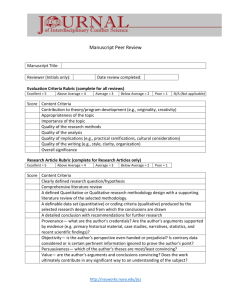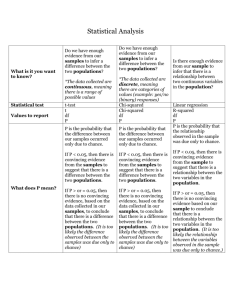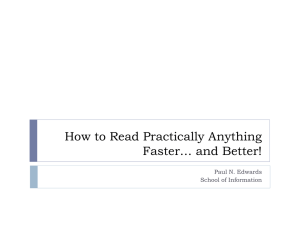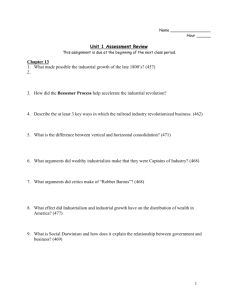Term Paper Topics
advertisement
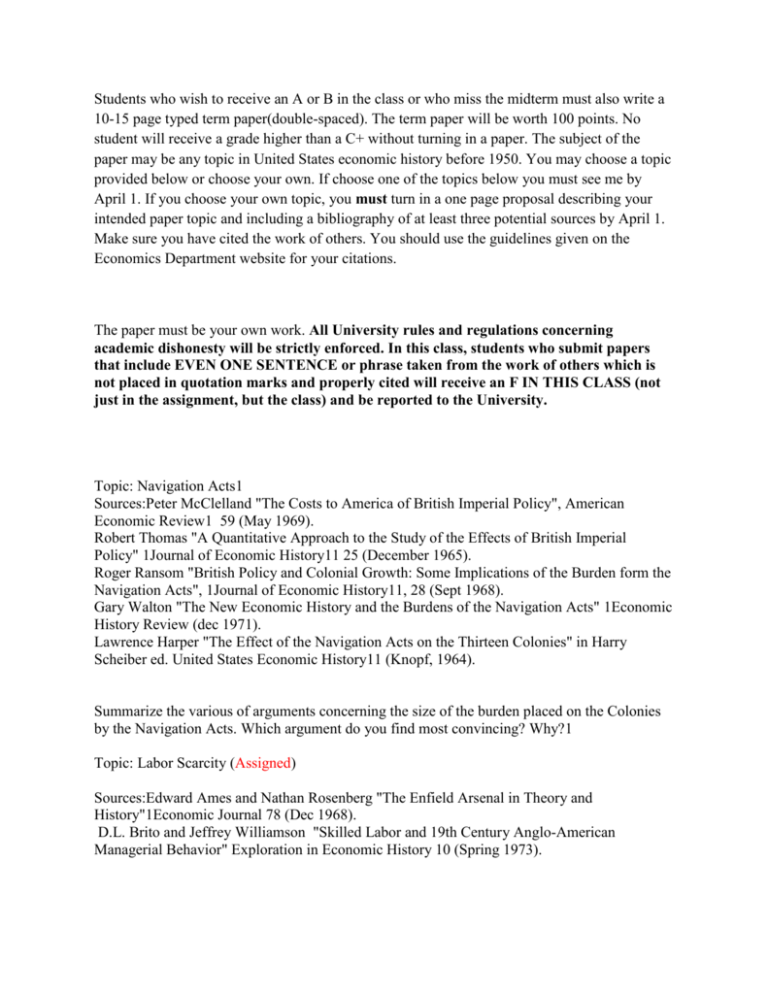
Students who wish to receive an A or B in the class or who miss the midterm must also write a 10-15 page typed term paper(double-spaced). The term paper will be worth 100 points. No student will receive a grade higher than a C+ without turning in a paper. The subject of the paper may be any topic in United States economic history before 1950. You may choose a topic provided below or choose your own. If choose one of the topics below you must see me by April 1. If you choose your own topic, you must turn in a one page proposal describing your intended paper topic and including a bibliography of at least three potential sources by April 1. Make sure you have cited the work of others. You should use the guidelines given on the Economics Department website for your citations. The paper must be your own work. All University rules and regulations concerning academic dishonesty will be strictly enforced. In this class, students who submit papers that include EVEN ONE SENTENCE or phrase taken from the work of others which is not placed in quotation marks and properly cited will receive an F IN THIS CLASS (not just in the assignment, but the class) and be reported to the University. Topic: Navigation Acts1 Sources:Peter McClelland "The Costs to America of British Imperial Policy", American Economic Review1 59 (May 1969). Robert Thomas "A Quantitative Approach to the Study of the Effects of British Imperial Policy" 1Journal of Economic History11 25 (December 1965). Roger Ransom "British Policy and Colonial Growth: Some Implications of the Burden form the Navigation Acts", 1Journal of Economic History11, 28 (Sept 1968). Gary Walton "The New Economic History and the Burdens of the Navigation Acts" 1Economic History Review (dec 1971). Lawrence Harper "The Effect of the Navigation Acts on the Thirteen Colonies" in Harry Scheiber ed. United States Economic History11 (Knopf, 1964). Summarize the various of arguments concerning the size of the burden placed on the Colonies by the Navigation Acts. Which argument do you find most convincing? Why?1 Topic: Labor Scarcity (Assigned) Sources:Edward Ames and Nathan Rosenberg "The Enfield Arsenal in Theory and History"1Economic Journal 78 (Dec 1968). D.L. Brito and Jeffrey Williamson "Skilled Labor and 19th Century Anglo-American Managerial Behavior" Exploration in Economic History 10 (Spring 1973). Paul David " Labor Scarcity and the Problem of Technological Practice and Progress in 19th Century America" in Technological Choice Innovation and Economic Growth (Cambridge 1975). Robert Fogel "The Specification Problem in Economic History" Journal of Economic History27 (Sept 1967). Peter Temin "Labor Scarcity and the Problem of American Industrial Efficiency in the 1850s" Journal of Economic History26 (Sept 1966). Was labor scarcity responsible for high rate of technological change in the US? Compare and contrast the various arguments and indicate which one you find most convincing and why. Topic: Efficiency of Free Banking (Assigned) Sources:Hugh Rockoff "New Evidence on Free Banking in the United States", American Economic Review 75 (Sept 1985). Hugh Rockoff "Varieties Banking and Regional Economic Development the United States Journal of Economic History 35 (Mar 1975). Arthur Rolnick and Warren Weber, "New Evidence on the Free Banking Era," American Economic Review 73 (Dec 1983). Arthur Rolnick and Warren Weber, "The Causes of Free Bank Failure: A Detailed Examination" Journal of Monetary Economic 14 (Nov 1984). Kenneth Ng "Free Banking Laws and Barriers to Entry in Banking, 1838-1860" Journal of Economic History (Dec 1988). Summarize the various of arguments concerning the efficiency of free banking. What do the arguments imply about state regulation of the banking system? Which argument do you find most convincing? Why? Topic: Black welfare and property Accumulation in the postbellum South Sources:Steven DeCanio "Accumulation and Discrimination in the Postbellum South" 2Exploration in Economic History16 (April 1979). Robert Higgs Competition and Coercion (New York, 1977) Robert Higgs "Accumulation of Property by Southern Blacks before World War I" 2American Economic Review 72 (Sept 1982). Robert Higgs "Accumulation of Property by Southern Blacks before World War I: Reply" American Economic Review 74 (Sept 1984). Robert Margo "Accumulation of Property by Southern Blacks before World War I:Comment and Further Evidence"2American Economic Review74 (Sept 84). Roger Ransom and Richard Sutch 2One Kind of Freedom (New York 1977)2 Compare and contrast these different views of the ability of blacks to accumulate property in the South after the Civil War? Which argument do you find most convincing? Why? 2 Topic: Bank Failure in the 1930s (Assigned) Sources:Milton Friedman and Anna Schwatz A Monetary History of the United States33 (Princeton, 1965) chapter 7 Lynn Muchmore "The Banking Crisis of 1933" Journal of Economic History33 (Sept 1970). Eugene White "A Reinterpretation of the Banking Crisis of 1930" 3Journal of Economic History 44 (1984). G.M. Anderson, W. F. Shugart and R.D. Tollison "A Public Choice Theory of the Great Contraction" 3Public Choice59 (Nov 1988). Summarize the various of arguments concerning the causes bank failure in the 1930s. What do the arguments imply about state regulation of the banking system? Which argument do you find most convincing? Why? Do any of them suggest solutions to current problems in the financial sector?3 Topic: Canals Sources:Albert Neimi "A Further Look at Interregional Canals and Economic Specialization 1820-1840" Explorations in Economic History7 (Summer 1970). Roger Ransom "Interregional Canals and Economic Specialization in the Antebellum United States"Exploration in Economic History 5 (Fall 1967). Harvey Segal "Canals and Economic Development" in Carter Goodrich (ed) 3Canals and American Economic Development33 (Columbia 1961). Harry Scheiber The Ohio Canal Era (Ohio University 1969). How important were canals to US economic growth? Summarize the various arguments made and indicate which one you find most convincing and why. Topic: Efficiency of Slave Plantations (Assigned) Sources:Robert Fogel and Stanley Engerman "Exploring the Relative Efficiency of Slave Agriculture in the Antebellum South" American Economic Review67 (June 1977). Robert Fogel and Stanley Engerman "Exploring the Relative Efficiency of Slave Agriculture in the Antebellum South: A reply" American Economic Review 70 (Sept 1980). Robert Fogel and Stanley Engerman 3Time on the Cross (Little Brown 1974 Gavin Wright " The Efficiency of Slave Agriculture: Another Interpretation" American Economic Review 69 (1979). Compare and contrast the various arguments concerning the efficiency of slave plantations. What does each one imply should happen to the plantation system after emancipation? Which one you find most convincing and why? Topic: slavery and economic growth Sources:Alfred Conrad, Douglas Dowd et. al. "Slavery as an Obstacle to Economic Growth in the United States" 3Journal of Economic History 27 (Dec 1967). Robert Fogel and Stanley Engerman 3Time on the Cross33 (Little Brown 1974 William Parker "Slavery and Southern Economic Development" 3Agricultural History 44 (Jan 1970). 3 Compare and contrast the various arguments concerning the effect of slavery on southern economic growth. Which one you find most convincing and why? 3 Topic: Economic Causes of the Civil War (Assigned) Sources:Bennett Baack and Edward Ray "Tariff Policy and Income Distribution: The Case of the United States 1830-1860" 4Explorations in Economic History (winter 1973/1974) Claudia Goldin "The Economics of Emancipation" 4Journal of Economic History 33 (March 1973) Gerald Gunderson "The Origin of the American Civil War" Journal of Economic History 34 (Dec 1974) Lloyd Metzler " Tariffs, the Terms of Trade and the Distribution of National Income" Journal of Economic History57 (Feb 1949). Gavin Wright The Political Economy of the Cotton South (Norton 1978) chapter 5.4 Compare and contrast the various arguments concerning the importance of slavery and tariffs as a cause of the Civil War. Which one do you is more likely to be important and why? Topic: Wage Lag and the Civil War Sources:Stephen DeCanio and Joel Mokyr " Inflation and Wage Lag During the American Civil War" 4Explorations in Economic History (Oct 1977) Stanley Engerman "The Economic Impact of the Civil War" 4Explorations in Economic History (Spring/Summer 1966) Reuben Kessel and Armen Alchian "Real Wages in the North During the Civil War: Mitchell's Data Reinterpreted" in Ralph Andreano (ed) Economic Impact of the Civil War ( Cambridge 1967). Wesley Mitchell, " The Greenbacks and the Cost of the Civil War" in Ralph Andreano (ed) 4Economic Impact of the Civil War( Cambridge 1967). Discuss the arguments for and against the wage lag thesis (unanticipated inflation caused a drop in real wages in the North during the Civil War). Which one do you find the most convincing and why? Topic: Debt Peonage Sources:Yoram Barzel " An Economic Analysis of Slavery" Journal of Law and Economics (Jan 1977) William Brown and Morgan Reynolds "Debt Peonage Reexamined" Journal of Economic History44 33 (Dec 1973). Roger Ransom and Richard Sutch "Debt Peonage in the Cotton South After the Civil War" 4Journal of Economic History 32 (Dec 1972). Roger Ransom and Richard Sutch One Kind of Freedom (New York 1977). Roger Ransom and Richard Sutch "Credit Merchandising in the Post Emancipation South" 4Exploration in Economic History15 (Jan 1979)4 Discuss the arguments for and against the existence of debt peonage. Which one do you find the most convincing and why? Topic: self-sufficiency in southern agriculture Sources:Robert McGuire and Robert Higgs "Cotton, Corn and risk in the 19th Century: Another View Explorations in Economic History 14 (April 1977). Gavin Wright and Howard Kunreuther "Cotton Corn and Risk in the 19th Century" 4Journal of Economic History 35 (Sept 1975). Robert Gallman "Self-sufficiency of the Cotton Economy of the Antebellum South" in William Parker (ed.) The Structure of the Cotton economy of the Antebellum South (Washington DC 1970). Roger Ransom and Richard Sutch One Kind of Freedom (New York 1977). Joseph Reid "White Land, Black Labor and Agricultural Stagnation. The Causes and Effects of Share cropping in the Postbellum South" 5Explorations in Economic History15 (Jan 1979)5 Did small southern farms become less self sufficient after the Civil War? If so Why? Discuss the arguments made to answer this question. Which one do you find the most convincing and why? 5 Topic: Contractual Choice in Postbellum Soiutthern Agriculture5 Sources:Robert Higgs "Race Tenure and Resource Allocation in Southern Agriculture" 5Journal of Economic History 33 (March 1973). Joseph Reid "Sharecropping as an Understandable Market Response: The Post Bellum South " 5Journal of Economic History 33 (March 1973). Joseph Reid "White Land, Black Labor and Agricultural Stagnation. The Causes and Effects of Share cropping in the Postbellum South" 5Explorations in Economic History 15 (Jan 1979) Gavin Wright " Freedom and the Southern Economy" 5Explorations in Economic History 15 (Jan 1979) Roger Ransom and Richard Sutch One Kind of Freedom (Cambridge 1977)5 Discuss the various explanations for why sharecropping was prevalent in the postbellum South and whether or not it led to inefficiency? Which one do you find the most convincing and why? Topic: Agrarian Discontent Sources:John Bowan and Richard Keen "Agricultural Terms of Trade in Four Midwestern States 1870-1900" 5Journal of Economic History 34 (March 1974). Barry Eichengreen "Mortgage Interest Rates in the Populist Era" American Economic Review74 (Dec 1984). Robert Higgs "Railroad Rates and the Populist Uprising" 5Agricultural History44 (July 1970) Ann Mayhew " A Reappraisal of the Causes of Farm Protest in the United States 1870-1900" Journal of Economic History32 (June 1972) Robert McGuire "Economic Causes of Late Nineteenth Century Agrarian Discontent" Journal of Economic History 41 1981.5 Discuss the various explanations agrarian discontent after the Civil War? Which one do you find the most convincing and why? 5 Topic: Railroad Subsidies (Assigned) Sources:Stanley Engerman " Some Economic Issues Relating to railroad subsidies and the Evaluation of Landgrants" Journal of Economic History32 (June 1972). Heywood Fleisig "The Union Pacific Railroad and the Railroad Land Grant Controversy" 5Exploration in Economic History 11 (Winter 1973). Heywood Fleisig "The Central Pacific Railroad and the Railroad Land Grant Controversy" Journal of Economic History 35 (1975). Loyd Mercer " Land Grants to American Railroads: Social Cost or Social Benefit" 6Business History Review 44 ( Summer 1969) Loyd Mercer " Taxpayers or Investors: Who Paid for the Land Grant Railroads?" 6Business History Review46 ( Autumn 1972)6 Were railroad subsidies efficient? Discuss the various arguments? Which one do you find the most convincing and why? Topic: Railroad Regulation Sources:Robert Harbeson "Railraods and Regulation 1877-1916: Conspiracy or Public Interest?" Journal of Economic History 27 (June 1967). Gabriel Kolko Railroads and Regulation 1877-1916 (Norton 1970).Paul MacAvoy The Economic Effect of Regulation (MIT 1965). John Ulen " The Market for Regulation: The ICC 1887-1920" 6American Economic Review70 ( 1980) Did the regulation of the railroads lower prices to consumers and farmers or increase railroad profits? Discuss the various arguments? Which one do you find the most convincing and why? Topic: New Deal (Assigned) Sources:Leonard Arrington "Western Agriculture and the New Deal" Agricultural History (Oct 1970). Don Reading " New Deal Activities and the States 1933-1939" Journal of Economic History 33 (Dec 1973) Gavin Wright "The Political Economy of New Deal Spending: An Econometric Analysis" Review of Economics and Statistics 56 (Feb 1974) Discuss the various explanations of the pattern of spending during the New Deal? Which one do you find the most convincing and why?
